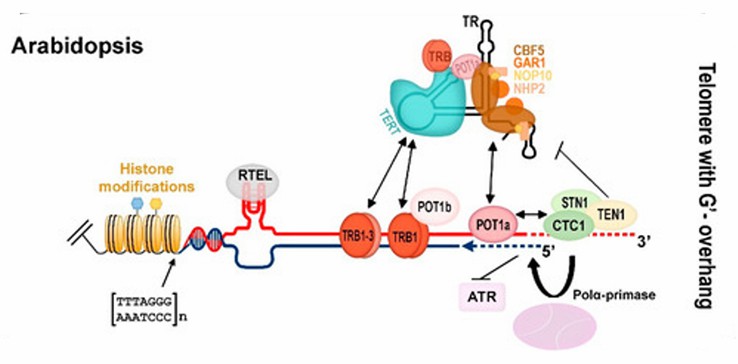In most eukaryotes, telomeres are formed by tandem arrays of short G/C-rich repeats. The telomeric G-rich strand is always oriented with its 3' end towards chromosome termini and forms short single-stranded protrusions called G-overhangs. Telomeres distinguish the ends of native chromosomes from harmful DNA double-strand breaks (DSBs). This is achieved by assembling chromosome termini in elaborate high-order nucleoprotein structures that, in most organisms, encompass telomeric DNA, specific telomere-associated proteins, and general chromatin and DNA repair factors.
 Fig. 1 Comprehensive schematic of the Arabidopsis terminal telomere complex. (Procházková Schrumpfová P, et al., 2019)
Fig. 1 Comprehensive schematic of the Arabidopsis terminal telomere complex. (Procházková Schrumpfová P, et al., 2019)
Lifeasible, as a renowned biotechnology company, stands at the forefront of plant telomere research and analysis. Our comprehensive suite of innovative techniques and approaches for plant telomere analysis ensures accurate and reliable results.
Lifeasible offers a state-of-the-art plant telomere length assay that utilizes innovative molecular biology techniques. Measuring telomere length is crucial to assessing cellular aging and the impact of various factors on telomere maintenance. The plant telomere length assay allows precise quantification of telomeric repeats in plant cells.
Plant Telomerase Activity Assay
Analysis of Plant Telomere Binding Proteins
We offer cutting-edge techniques for the analysis of plant telomere-binding proteins. By employing advanced molecular biology methods, such as chromatin immunoprecipitation and DNA-protein interaction assays, the company enables comprehensive investigations of plant telomere-binding proteins and their interaction networks.
Analysis of Plant Telomere Integrity
Our innovative approaches for plant telomere integrity analysis allow researchers to assess telomere integrity accurately. The integrity of telomeres is vital for maintaining genomic stability and preventing chromosomal aberrations. Analyzing plant telomere integrity provides essential information about the susceptibility of telomeres to degradation and the impact of various factors on telomere stability.
Analysis of Plant Telomere Stability
We provide state-of-the-art plant telomere stability analysis techniques, encompassing a range of molecular and cellular approaches. Telomere stability is a key aspect of telomere biology, and its impairment can lead to genomic instability and cellular senescence.
Analysis of Plant Telomere Dynamics
We also help our customers analyze plant telomere dynamics. Understanding the dynamics of telomeres in plants is critical for elucidating their role in growth, development, and stress responses. Analyzing plant telomere dynamics involves investigating changes in telomere length, telomerase activity, telomere binding proteins, and telomere integrity over time.
Utilizing Lifeasible's advanced technological platforms enables researchers to study various aspects of plant telomeres, including length, telomerase activity, binding proteins, integrity, stability, and dynamics. If you are interested in our services or have some questions, please feel free to contact us or make an online inquiry.
Reference